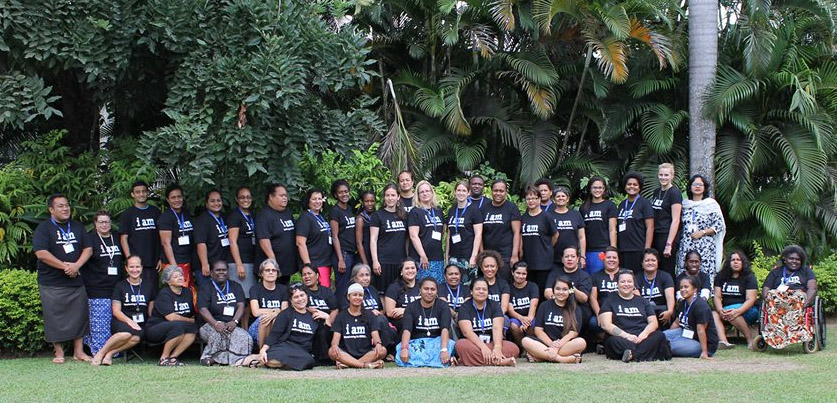Launching the new initiative, Pacific Partnerships on Gender, Climate Change, and Sustainable Development, this convening assembled 60 representatives from Pacific civil society organizations, regional technical bodies (SPC as well as the Pacific Islands Forum Secretariat), and national women’s machineries in nearly a dozen Pacific countries. The initiative was jointly developed and co-convened by Secretariat of the Pacific Community, Diverse Voices and Action for Equality, Pacific Youth Council, and Regions Refocus, in partnership with DAWN, The Women’s Major Group on Sustainable Development, Fiji Women’s Rights Movement, WECF, UN Women Multi-Country Office, Global Fund for Women, and Heinrich Boell Foundation with many others providing expertise and financial resources.
The meeting began with two days of capacity-building and sharing amongst civil society representatives, who engaged in cross-sectoral group work, wrote and presented mini-statements, learned advocacy strategies, and benefited from structured and individualized feedback and collective planning. The civil society sessions resulted in the Civil Society Outcome Statement, adopted by consensus after a powerful collaborative process. Discussions on gender, climate change, and sustainable development emphasized an intersectional, interlinkage approach with cross cutting analysis recognizing how issues were interlinked, and especially the gendered impacts of climate change. In doing so, they also rejected a narrative of women as “victims” of climate change, emphasizing women’s skills, contributions, and roles as leaders and drivers of justice.
The next day, the civil society contingent was joined by government representatives, who had engaged in a separate meeting at the same location during the beginning of the week. Together, participants dedicated a considerable amount of energy and time to joint analysis and strategy, working collectively in national and thematic breakout groups to identify priorities and build collaboration towards upcoming regional processes, including the subsequent meeting of the Pacific Islands Forum, as well as specific focus on the Small Islands Developing States (SIDS) preparatory process and conference (to be held in Apia, Samoa 1-4 September 2014) and regional priorities towards the post-2015 agenda.
From this process emerged the first ever joint statement by Pacific government and civil society representatives, the Joint Civil Society-Government Statement. It includes strong, progressive language on climate finance, gender equality including through legislation, and structural issues of trade and the international financial system. It demands, in no uncertain terms, the “fundamental structural and transformational changes to the current neoliberal, extractivist and exclusive development model that perpetuates inequalities of wealth, power and resources between countries, within countries and between women and men.” The document also looks towards the upcoming pivotal meetings of the UN Framework Convention on Climate Change (UNFCCC).








